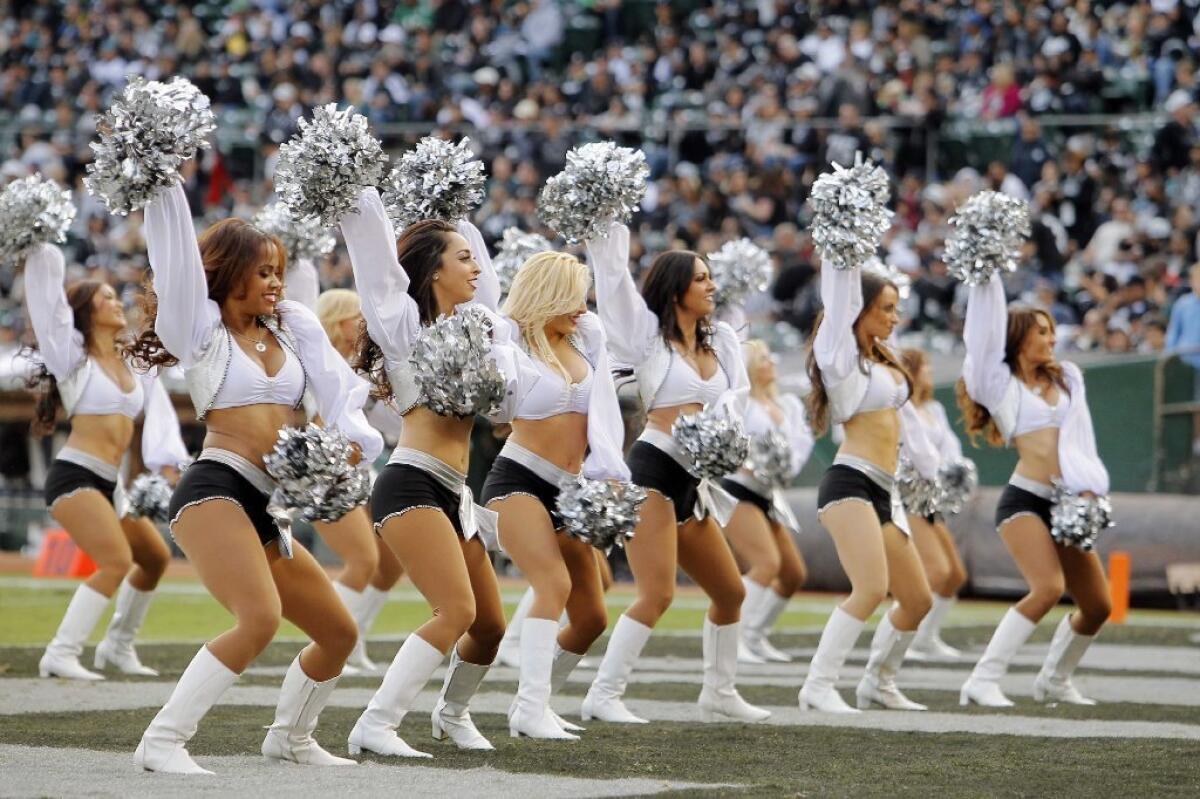The Raiders strike back at cheerleaders: You can’t sue us, ladies

OAKLAND -- The allegations in the cheerleaders’ lawsuit are pretty straightforward: When it comes to working conditions for the Raiderettes, the Oakland Raiders routinely break California labor law.
The women, who are professional dancers, earn less than minimum wage and are paid at the end of the season instead of every two weeks as required by California law. They earn $125 per game and are not paid for practices or meetings. They can be fined for being late to practice, or for not having the right hair color or for failing to appropriately polish their nails. They are required to make unpaid appearances on behalf of the team.
The cheerleading squad, in short, operates under a paternalistic set of rules that not only infantilizes grown women, but also makes demands that no employer should have the right to make.
But will the cheerleaders ever get their day in court?
Not if the Raiders can help it.
In the team’s first official response to the lawsuit, which was filed Friday, Raiders’ attorneys say that when the Raiderettes signed their contracts, they signed away their rights to sue in court.
Like many lopsided contracts that favor employer rights over employee rights, the Raiders claim that the cheerleaders’ contract requires arbitration. The Raiders have asked Alameda County Superior Court Judge Wayne Carvill to put the lawsuit on hold and force Lacy T. and Sarah G. to plead their case with the NFL commissioner.
That’s right.
Rather than presenting their case before an impartial judge, the women’s claims would be evaluated by NFL Commissioner Roger Goodell, who would be free to ignore rules of evidence, rules of discovery and state labor laws. He can demand the whole process be cloaked in secrecy, and he can also demand the outcome be kept confidential. The cheerleaders would not be able to appeal in any court or forum.
“Both [plaintiffs] signed written employment agreements stating that ‘all disputes’ they have with the Oakland Raiders shall be subject to binding arbitration through the National Football League,” wrote attorney David J. Reis on behalf of the team. Raiderettes, he said, “are not entitled to seek redress in a court of law for any of their claims.” Nor, says the team, can the women be part of a class-action lawsuit.
The Raiderettes’ attorneys, Leslie Levy and Sharon Vinick, were surprised by the worldwide attention their lawsuit generated, but they were prepared for the team’s response.
“As we see it,” Vinick said, “this is a contract full of illegal provisions, and trying to appoint the NFL commissioner to act as judge and jury is just one more. It just doesn’t pass the smell test for the Raiders to suggest that the NFL commissioner is unbiased when it comes to a dispute between the team owners who elect him and pay him his $44-million salary and a group of non-unionized cheerleaders.”
Levy added: “The NFL commissioner can certainly enforce the rules of football. But whether the Raiders have broken the laws of California should be decided by a judge and jury, not a secret kangaroo court set up by the NFL.”
This move by the Raiders forces the lawsuit onto a much broader playing field.
Now the case is not just about a football team’s appalling business practices toward its cheerleaders. It now becomes a case about whether so-called “forced arbitration” clauses are legal.
In California, courts have sometimes been amenable to tossing forced arbitration clauses if they can be shown to contain “unconscionable provisions” or other defects.
“We believe we have a good shot at defeating it,” Levy said.
Forced arbitration is a fantastic boon to employers. The National Employment Lawyers Assn., however, calls it “the insidious practice of employers requiring workers – from minimum wage employees to U.S. service members to professionals – to give up their rights under federal, state and local anti-discrimination and other worker protection laws in order to get or keep their jobs.”
More than a quarter of American companies, employing some 36 million workers, or one-third of the non-union workforce, say they require arbitration for employment disputes. The lawyers group, which supports voluntary arbitration, says the practice not only denies American workers access to justice, but from the get-go stacks the deck against workers, who often must agree to forced arbitration as a condition of employment.
The Raiderette case, said Julie M. Strandlie, the lawyer group’s legislative and public policy director, is “the perfect example of what’s wrong with forced arbitrations.”
In most cases, as in this one, she said, “the arbitrators are generally picked by the employer and most often are paid for by the employer.”
And, huge surprise here, an “extremely high percentage of decisions” favor the company over the worker.
Last spring, two members of Congress, U.S. Sen. Al Franken (D-Minn.) and U.S. Rep. Hank Johnson (D-Ga.) introduced the Arbitration Fairness Act of 2013. It would amend federal arbitration law by making it unlawful for employers to impose arbitration on employees, except when they knowingly and voluntarily agree to it after a dispute arises.
Unfortunately, the issue is not at the top of anyone’s most pressing political list at the moment. But it should be.
Why should employers hold all the cards in a job-related dispute? Why should anyone be prevented from suing their company if they believe it has violated labor laws?
Forced arbitration is just another example of a culture that expects workers to be grateful for every little crumb, while the fat cats--and football team owners--dine out at their expense.
Twitter: @robinabcarian
More to Read
Get our high school sports newsletter
Prep Rally is devoted to the SoCal high school sports experience, bringing you scores, stories and a behind-the-scenes look at what makes prep sports so popular.
You may occasionally receive promotional content from the Los Angeles Times.







